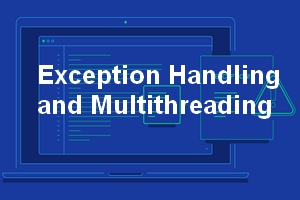
Choose Your Desired Option(s)
# Exception Handling and Multithreading: An SEO Guide
## Understanding Exception Handling
### What is Exception Handling?
Exception handling is a critical programming technique that ensures software robustness by managing runtime errors gracefully. Instead of letting a program crash, exception handling catches and addresses errors, allowing for smooth recovery or informative error reporting. Key constructs include `try`, `catch`, and `finally` blocks, which are standard in languages like Java, Python, and C#.
### Why is Exception Handling Important?
Exception handling enhances user experience and application stability by preventing unexpected crashes and providing meaningful error messages. This helps in maintaining user trust and minimizes downtime, which is crucial for business-critical applications.
### Best Practices for Exception Handling
– **Catch Specific Exceptions**: Avoid catching generic exceptions. Catch specific exceptions to handle different error types precisely.
– **Log Errors**: Ensure all caught exceptions are logged for debugging and audit purposes.
– **Resource Management**: Use `finally` blocks to release resources like files or database connections, preventing resource leaks.
## Exploring Multithreading
### What is Multithreading?
Multithreading is the concurrent execution of multiple threads within a single process, allowing tasks to run in parallel. This improves the performance of applications, particularly those with CPU-intensive operations. Threads share the same process resources but execute independently, making multithreading ideal for applications like web servers, games, and real-time data processing.
### Benefits of Multithreading
– **Enhanced Performance**: By executing tasks concurrently, multithreading maximizes CPU utilization and speeds up processing.
– **Responsive Applications**: Multithreading ensures that applications remain responsive, as long-running tasks can run in the background without freezing the main application.
### Best Practices for Multithreading
– **Thread Safety**: Use synchronization mechanisms (e.g., locks, semaphores) to manage access to shared resources and prevent race conditions.
– **Optimize Thread Count**: Avoid creating too many threads to prevent overhead. Use thread pools to manage and reuse threads efficiently.
– **Monitor and Debug**: Utilize tools for monitoring and debugging to identify issues like deadlocks and bottlenecks.
## Challenges in Exception Handling and Multithreading
### Managing Deadlocks
Deadlocks occur when threads are waiting indefinitely for resources held by each other. To prevent deadlocks:
– Implement proper locking mechanisms.
– Avoid nested locks.
– Use timeout settings for locks.
### Exception Handling in Multithreading
Handling exceptions in multithreaded applications requires careful planning. Ensure that exceptions within threads are caught and managed appropriately. Consider thread-specific exception handling strategies.
## Conclusion
Mastering exception handling and multithreading is vital for developing reliable, high-performance applications. By implementing best practices, developers can build systems that handle errors gracefully and make efficient use of system resources, leading to enhanced application stability and user satisfaction.
**Keywords**: Exception Handling, Multithreading, Error Management, Concurrent Execution, Performance Optimization, Thread Safety, Deadlocks, Resource Management.
—
## FAQs
**Q: What is the purpose of exception handling?**
A: Exception handling ensures that errors during program execution are managed gracefully, preventing crashes and allowing for smooth recovery or informative error reporting.
**Q: How does multithreading improve application performance?**
A: Multithreading allows tasks to run concurrently, maximizing CPU utilization and speeding up processing, which is particularly beneficial for CPU-intensive operations.
**Q: What are common challenges in multithreading?**
A: Common challenges include managing deadlocks, ensuring thread safety, and handling exceptions within threads.
**Q: What are best practices for exception handling?**
A: Best practices include catching specific exceptions, logging errors, and using `finally` blocks to release resources.
**Q: Why is thread safety important in multithreading?**
A: Thread safety prevents race conditions by ensuring that shared resources are accessed in a synchronized manner, which is essential for maintaining data integrity.
Share Now!





